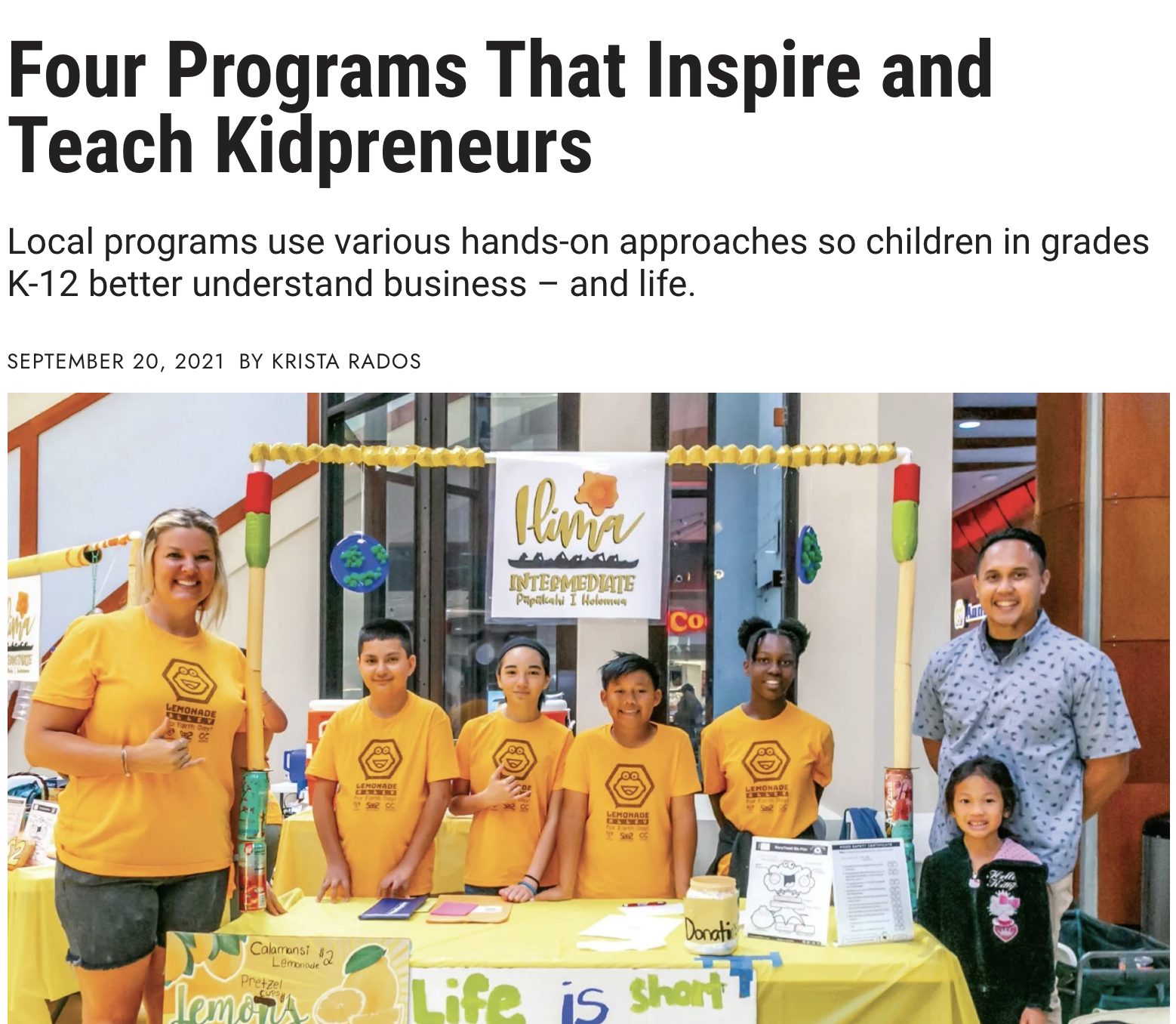Huge thanks to Honolulu Business Magazine for recognizing three of our kidpreneur programs in this recent article. Of course Lemonade Alley has been the prototype kidpreneur program in Hawaii, starting in 2011.
Kidpreneur Project-Based Learning
And it’s nice to see our Lemonade Alley spin-off program, Project Lemon Tree also get featured in the article. PLT represents a major upgrade in project-based learning as we’ve combined themes of sustainability, agriculture, building trades, local culture, innovation, design-thinking and social venturing into a single multi-disciplinary program. The result is a flexible project-based learning (“PBL”) model for teachers to cherry-pick lessons that they wish to implement. While they could do the system front to back cover, single lessons for a simple day experience can also be implemented on their own.
“Entrepreneurship” vs “Social Venturing”
While the “entrepreneurship” label continues to be popular in schools, Bizgenics has always championed “social ventures” which take businesses beyond pure profit and define how to do societal good while making a living. For example, Lemonade Alley contestants choose a charity of their choice to donate lemonade sales to. Likewise, Project Lemon Tree is about doing ecological good and making useful things for our community in addition to learning useful career skills.
Next-Gen Design-Thinking for IPA
HBM also referenced a re-visioning of Island Pacific Academy (IPA), a private K-12 school in Kapolei that is currently being made into the first design-thinking secondary school in America. Bizgenics was contracted to drive the re-visioning of this school and is now on a phase 2 contract developing a Scope & Sequence (i.e., an blueprint for curriculum planning and development). IPA has proven an open-minded and forward-thinking school with a strong administrative team lead by Head of Schools Gerald Teramae and two innovative principals, Steve Ross, Lower School Principal and Brandy Sato, High School Principal. Stay tuned for more on this flip as it promises to be “what education could be.”
See the HBM’s Inspiring Kidpreneur Programs Article »
Excerpts:
Four Programs That Inspire and Teach Kidpreneurs
Local programs use various hands-on approaches so children in grades K-12 better understand business – and life. SEPTEMBER 20, 2021 | KRISTA RADOS
“Steve Sue likes to start young when nurturing the next generation of public-spirited entrepreneurs. He launched Lemonade Alley in 2011, a lemonade stand challenge for children in kindergarten through high school. Sue says that while it teaches Hawai‘i’s youth how to make a profit, each team also chooses which charity will receive their earnings.
“I’m really on the bandwagon about not stopping with entrepreneurship but moving to social venturing. They can make a living themselves, they can even be rich, but they should still be looking at how to sustain the world and the economy and help people in need,” he says.
Over the past decade, participants in Lemonade Alley have donated over $200,000 to various charities.
Lemonade Alley is unique, but it’s not the only program in Hawai‘i that aims to inspire and teach young people about entrepreneurship before they reach college.
Project-Based Learning
One way K-12 schools are fostering the next generation of entrepreneurs and creators is through hands-on learning, says Brandy Sato, the secondary school principal at Island Pacific Academy.
Starting in fall 2021, IPA will transition from the International Baccalaureate Programme to Design Thinking, a curriculum for students and teachers to create innovative solutions for their communities using empathetic understanding and problem-solving.
“We’re ready for the next evolution in our school and in our philosophy, and we really want to create a program that’s focused on student-centered knowledge, learning and creation,” Sato says.
IPA already offers a design technology course that Sato says gives students a chance to use design processes to make products that address community or school needs. Once students reach eighth grade, they have the chance to pitch their products to a group of “investors,” similar to the TV show Shark Tank, says Sato.
“We really want to expand on the concept of students as creators and innovators. And we think capitalizing upon design thinking and having that influence all of our academic disciplines in our secondary school is really going to provide more of those opportunities for kids to think about their future careers, and to see themselves as contributors to their community,” Sato says…”
“Making Lemonade
Lemonade Alley’s curriculum starts with teaching its young participants the basics of mixology, Steve Sue says, and then evolves to guiding them on how to form a sales pitch. The lemonade stands are made from recycled materials, which are then lined up every April to be judged by community experts.
One amazing thing is the liquid variations. “We can have 50 teams with just three ingredients: lemon juice, sugar and water. And the lemonades will all taste different. And the children will know why. … I would say some of our students have done better than what I have seen professional mixologists do locally,” Sue says.
The program can be taught at home by the children’s families or by a teacher looking to incorporate project-based learning into their curriculum, he says.
In a sister program, Project Lemon Tree, young leaders design and build pergolas to protect lemon trees on school campuses. Sue says the two programs work hand in hand because the trees provide participants with free lemons.
Katrina Kuo, a project manager for Project Lemon Tree in 2018, will start attending Stanford University in the fall. She says the project allowed her to apply what she learned in high school math and science classes to real-life projects.
“Because of this project, I was able to see the engineering side, along with how it was to manage individuals and business aspects. … When having your own business and company, you need to learn how to organize tasks, and how to bring new ideas to innovation,” Kuo says.”

